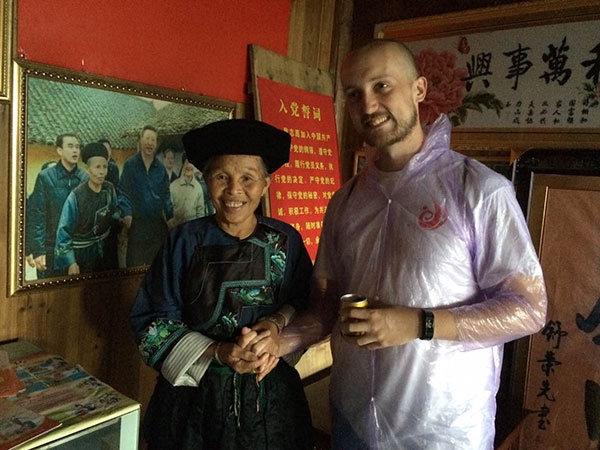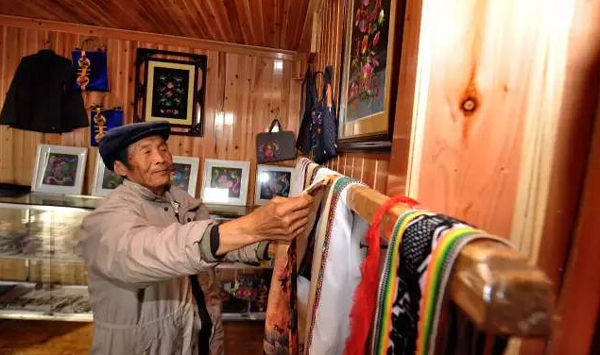
Long Decheng poses for a photo with China Daily reporter Tyler Terrance O'Neil in Shibadong, Hunan province, Aug 31, 2016. [Photo by Liu Jing/chinadaily.com.cn]
Within a few moments of stepping into Shibadong's village lodge, a spry elderly woman in an intricately embroidered dress and turban-like hat makes a beeline for me, grabs my hand, and begins babbling in a language I've never heard before.
Her name is Long Decheng, and she clearly has some things she wants to tell me.
After organizing a translation chain involving fellow China Daily reporter Liu Jing and a local fluent in both Mandarin and Miao dialect, we begin conversing.
Long starts, her statement is translated from Miao, to Mandarin, to English.
"Where are you from?"
"I'm from America."
English, Mandarin, Miao. Long replies. Miao, Mandarin, English.
"You are so tall and handsome."
Looks like Long is quite the flirt.
"Aside from looking beautiful, what do you do in the village?" I ask.
Another round of translation.
"I'm the village greeter, and I'm looking better now than I was a few years ago," she says before ushering us to a picture on the wall. In it she walks hand and hand with President Xi Jinping during his visit to Shibadong in 2013. She says it was not a good time for the community then—the general income was low, many of the buildings were in disrepair, and her son, like so many other men in the village, was unmarried.

Long's husband Shi Chengfu takes care of their hotel in Shibadong village, Hunan province,Dec 7, 2015. [Photo/Xinhua]
Since then, things have dramatically changed for Shibadong, and 76-year-old Long, with, as she says, "a dozen weights lifted from her shoulders," has never looked better.
In 2013, the annual per capita income for a villager in Shibadong was 1,668 yuan ($250). Most engaged in subsistence farming, only selling whatever they had in excess. Many of the young women of the village left to pursue education and better-paying careers, leaving Shibadong with an abundance of bachelors. Generally speaking, the situation was grim.
Xi visited the village in 2013, and it was then that he proposed his targeted poverty alleviation program. Instead of generalized programs, he wanted funds to be carefully applied to tailor-made programs. Huayuan county, where Shibadong is located, was given 100 million yuan to be used for low-interest loans, insurance, compensation for loses, and generally jumpstart new businesses.
The next year, village leaders set a goal to become the "most beautiful village in China." They renovated walkways, designed branding for village products, and began marketing the village as a tourism destination. They encouraged women to spend their free time doing embroidery for an additional 1,000 yuan per year, a huge bolster to these women's previous incomes. The prefecture's online store, which was featured as part of an online game, saw 20 million yuan in sales over two days, says Fu Chengjie, CEO of Pangu E-Commerce.
All of this saw a huge impact on Shibadong. The per capita income increased 115 percent to 3,580 yuan in 2015. Village officials say 261 people from 61 families within the village have been raised out of poverty. The village's industries have become more varied, with online sales of agricultural products, rice liquor, and embroidery providing a large increase in revenue. Tourism has also provided a boost to the village, with as many as 3,000 visitors per weekend.
And what did they do about all those bachelors? As the village improved financially, so did these unmarried men's prospects. They began holding events for singles at the village. Shi Jintong, in charge of the village's poverty program, said seven of Shibadong's bachelors have found wives in the last two years, with one even snagging a college-educated woman from metropolitan Chongqing. The couple is now running a hotel in the village and working to expand its tourism appeal.
And yes, Long Decheng's son also found a wife, much to her delight.
While the impact of Xi's targeted poverty alleviation program is often talked about, it's something altogether different to see it in action and succeeding. The hard work and drive of the village's people, augmented with a bit of funding, has completely changed the future of Shibadong.
China Daily reporter Liu Jing contributed to this story.
来源:China Daily
作者:Tyler Terrance O'Neil
编辑:尹曾祺